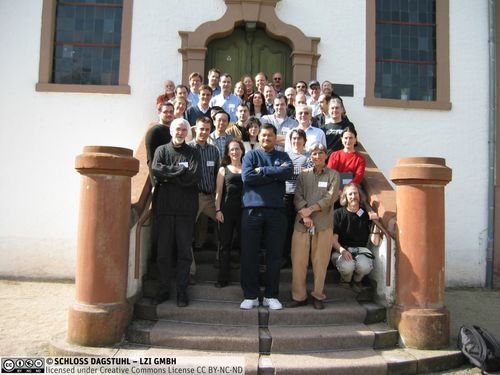Dagstuhl Seminar 04121
Evaluating Embodied Conversational Agents
( Mar 14 – Mar 19, 2004 )
Permalink
Organizers
- Elisabeth André (Universität Augsburg, DE)
- Kristina Höök (Swedish Institute of CS - Kista, SE)
- W. Lewis Johnson (USC - Marina del Rey, US)
- Catherine Pelachaud (University of Paris, FR)
- Zsofia Ruttkay (University of Twente, NL)
Contact
External Homepage
In the past years we have seen an increasing number of ECAs (Embodied Conversational Agents), as results (and sometimes also as medium) of academic research as well as in commercial applications in fields like information providing (news reader, info kiosk), user interfaces for deaf (lip-reading, signing avatars), education, commerce and entertainment. Due to the novelty of the field and the complexity of the problems, different paradigms and tools have been used to produce the individual ECAs, often tailored to the special needs of an application or of a research issue.
The comparison and re-use of ECAs has not been dealt with to a sufficient degree, in spite of the high costs of developing yet new ECAs. There have been studies that indicate added value of particular features of ECAs, but it remains to be determined in what situations fully functional ECAs are advantageous, and for what purpose. The sporadic evaluation experiments concentrated on special issues and under restricted circumstances. All the same, several of these partial evaluations have already produced surprising and for the future development and application of ECAs essential results, e.g. on the different preferences of different users.
For the evaluation and design guidelines of ECAs one should rely on results and methodologies of related fields like HCI, psychology, cultural anthropology and even arts. The different language and methodologies of these disciplines and lack of common forums have hindered the cross-fertilization. Feedback from the industry on commercial applications would also very useful.
Motivated by the above observations, the main objectives of the seminar were:
- to review the results, tools and resources;
- identify key problems and future research directions;
- initiate further activities to trigger and dissimilate work on ECA design and evaluation.
- Elisabeth André (Universität Augsburg, DE) [dblp]
- Tim Barker (Staffordshire University - Stafford, GB)
- Niels Ole Bernsen (University of Southern Denmark - Odense, DK)
- Jonas Beskow (KTH Royal Institute of Technology, SE)
- Gautam Biswas (Vanderbilt University, US) [dblp]
- Justine Cassell (Northwestern University - Evanston, US) [dblp]
- Marc Cavazza (Teesside University - Middlesbrough, GB) [dblp]
- Noor Christoph (University of Amsterdam, NL)
- Arjan Egges (University of Geneva, CH)
- Anton Eliens (VU University Amsterdam, NL)
- Michael Gerhard (Fraunhofer ISST, DE)
- Jonathan Gratch (USC - Playa Vista, US) [dblp]
- Dirk Heylen (University of Twente, NL) [dblp]
- Katherine Isbister (KTH Royal Institute of Technology, SE) [dblp]
- Mitsuru Ishizuka (University of Tokyo, JP)
- W. Lewis Johnson (USC - Marina del Rey, US) [dblp]
- Emiel J. Krahmer (Tilburg University, NL)
- Andrew Marriott (Curtin University - Bentley, AU)
- Stacy Marsella (USC - Marina del Rey, US) [dblp]
- Jean-Claude Martin (LIMSI - Orsay, FR) [dblp]
- Dominic W. Massaro (University of California - Santa Cruz, US)
- Anton Nijholt (University of Twente, NL)
- Han Noot (CWI - Amsterdam, NL)
- Patrick Olivier (Lexicle Ltd. - York, GB) [dblp]
- Nuno Otero (Technical University of Lisboa, PT)
- Ana Paiva (Technical University of Lisboa, PT) [dblp]
- Igor S. Pandzic (University of Zagreb, HR)
- Catherine Pelachaud (University of Paris, FR) [dblp]
- Danielle Pele (Telecom Bretagne - Cesson Sevigne, FR)
- Helmut Prendinger (National Institute of Informatics - Tokyo, JP)
- Matthias Rehm (Universität Augsburg, DE) [dblp]
- Thomas Rist (DFKI - Saarbrücken, DE)
- Zsofia Ruttkay (University of Twente, NL)
- Paul ten Hagen (Epictoid B.V. - Amsterdam, NL)


